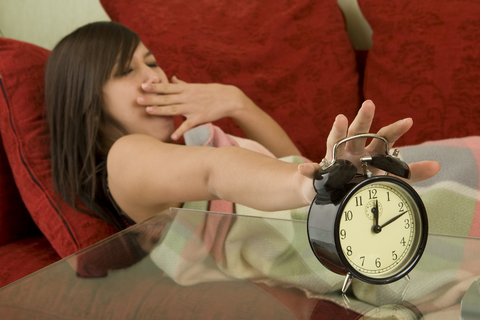Refreshing Sleep is Essential
What Sleep Does For Us
Are you one of the millions of people that wake up tired in the morning or suffer from sleepiness, moodiness and fatigue during the day? The chances are that you are suffering from insomnia. Insomnia refers to the lack of sufficient high-quality sleep and can be temporary, lasting a day or two or, if not rectified, can last for months on end.
Irrespective of your age, consistent good sleeping patterns are essential to both your emotional well-being and physical health. Most people assume that they know everything about correct sleeping patterns because sleep is such a natural part of our lives and one of the few things we are able to do from the minute we are born. Unfortunately there are many people who do not get sufficient high-quality sleep often do not realize what a difference this could make to the quality of their waking hours - better health, maximum alertness and improved mood are the rewards you will get if you practice good sleeping habits.
Our brains need sleep so that we can absorb and process what we learn during the day. Our ability to form memories and understand and utilize new information is diminished by disrupted sleep which leads to poorer performance both at work and in school.
Daytime habits have a noted effect on one's ability to experience high-quality sleep. By making small changes to your daily routine, you can drastically improve your entire sleep experience.
Insomnia must not be confused with insufficient total sleeping hours which can lead to sleep debt. "Sleep Debt" occurs when on an ongoing basis an individual sleeps less hours per day than what he actually needs. Over time the hours that the person is lacking in sleep accumulates and causes what is known to be sleep debt. Sleep debt can eventually lead to daytime sleepiness and have a major effect on the performance, mood and thinking of the person if not rectified. It is your responsibility towards yourself and those around you to avoid accumulating sleep debt.
Understanding Sleep

Examine both your daytime and sleeping habits to determine the cause of your sleeping problem. It could be lack of sufficient exercise, insufficient ventilation in your bedroom or the extra cup of coffee that is the core of your problem. Inability to relax and close your mind to problems is another major contributing factor to many sleeping problems.
Whether it is consciously or subconsciously stress and anger that have not been addressed during the day can interrupt your sleeping patterns at night. Effective time management, a positive attitude, exercising and learning to relax can all contribute to a positive sleep experience.
Change Your Attitude Towards Sleep
- Start by determining what your sleep needs are and establish and stick to a regular sleep schedule that meets these needs. Sleep routines are not only beneficial for children and are the basis for all good sleeping habits. Following a set sleeping schedule sets and stabilizes your sleep-wake biological clock, making it easier to fall asleep when you go to bed.
- There will be nights when you do go to bed later than planned and you will need to make up the lost sleep. It is better not to sleep later the next morning but rather to go to bed earlier the next evening.
Start your day brightly
- Our sleeping patterns are governed by our internal biological body clocks which are sensitive to light and dark. Sunlight instructs our bodies that it is daytime and helps us to make the transition to an active daytime phase. If possible, on waking go outside and get some sunlight or open the shades to let the sunlight in. An alternative is to turn on the lights and brighten your environment as soon as you wake up.
Daily Routines
- Make time during the day to exercise for 15 to 30 minutes. This should preferably be some time during the morning but if this is not possible limit yourself to not later than four hours before bedtime. You can break your exercise routine up into blocks of 5 or ten minutes if you so prefer. Brisk walks, cycling and swimming are ideal for stimulating circulation and are known to improve sleep experiences.
- Not all people benefit from napping and although it may help improve performance for some people others may be prolonging their insomnia by taking naps during the day. It is best to avoid napping if you are experiencing problems with sleeping at night or to limit yourself to a single nap of a maximum of 15 minutes half way through your day. If you do take naps then this should be part of your daily routine. Inconsistent napping will disrupt your night time sleep cycle.
Preparing For Bed
- There must be a cut-off point to every day's problems and to ensure a good night's sleep make the cut-off point on the way home from work or better still the moment you leave the office.
- Do all planning for the next day before you even start thinking of bedtime routines. Make your to-do list, sort out any problems that you can and then forget about what needs to be done tomorrow.
- Learn to relax before going to bed. Work out a routine that includes activities that help you to relax. This will differ depending on your personal interests but can include reading an article or book, listening to soothing music, playing solitaire, taking a warm relaxing bath or doing some form of light exercise, such as yoga.
- If you have a problem initiating sleep avoid beverages that are known to be stimulants, particularly after four in the afternoon. These would include all caffeinated drinks such as coffee, most soft drinks and any tea other than herbal tea. Some types of medication and diet drugs also contain sufficient caffeine to disrupt sleeping patterns and decrease total sleep time.
- Another stimulant that should be avoided in the evenings is nicotine. Nicotine patches and smoking can result in problems initiating sleep and if you have a serious sleep problem then it is advisable to consider quitting smoking altogether.
- The intake of alcohol should be avoided close to bedtime as it can prevent you from reaching deep sleep and may cause intense dreaming, headaches, sweatiness and excessive snoring which will detract from your sleep experience.
- You should not eat a heavy meal just before bedtime but neither should you get into bed hungry. Cookies and crackers are suitable snacks to eat near bedtime if you are feeling hungry.
- A full bladder will disturb your sleep and you should curtail your fluid intake two hours before sleep time.
- Wear loose clothing to sleep in.
- Bed must be large enough to allow you to move freely while sleeping.
Sleep Conducive Environment
Sleep-Conducive Environment
Firstly make sure that the atmosphere in your bedroom is conducive to a fulfilling restorative sleep.
- Your bedroom should be a sleep sanctuary and should only be associated with rest and sleep.
- Beds are for sleeping and intimacy and any activity in your bed that will detract from your ability to relax must be avoided. Do not use your bedroom to watch television, work on your laptop, eat, drink, or read. Your bedroom must only be associated with its prime functions and those are to sleep and have sex.
- Keep the noise level down in your bedroom and if outside noises are the problem then try listening to soothing recordings of rain, running water or waves.
- Your bedroom should ideally be temperature-controlled as extreme temperatures make comfortable sleep an impossibility. The use of a quality comforter can replace the need for artificial means of controlling room temperatures.
- Proper ventilation is imperative if you want to wake up fresh and relaxed. Drafts and stuffiness are equally disrupting and detract from your overall sleep experience.
- Keep your bedroom dark and block out any exterior light which could give your internal clock the signal that daytime has arrived.
- If you have an alarm clock or a wall clock in your room make sure that the face is not visible to you when you lie in bed. Clock watching is a sure way to intensify your insomnia.
- Never allow your pets to sleep with you. Besides the allergy and hygiene implications of pet hair on your bedding, their movements during the night will in all likelihood disrupt your sleep.
- Make sure that your pillow is suited to your sleeping style. The optimal firmness of a pillow will depend on whether you are a back- side- or stomach-sleeper.
- Invest in a good-quality mattress, comforter and pillows - your comfort in bed affects the quality of your sleep.
If you experience difficulty in falling asleep do not lie in bed trying to sleep for longer than half and hour. Get up and leave your bedroom for a while. Go and read, listen to music or do some yoga exercises for about 20 minutes and then return to bed and try to sleep.









